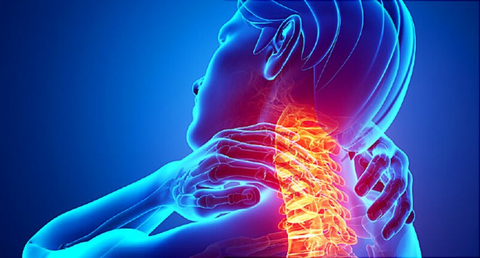What is neck pain?
Your neck is made up of vertebrae that extend from the skull to the upper torso. Cervical discs absorb shock between the bones.
The bones, ligaments, and muscles of your neck support your head and allow for motion. Any abnormalities, inflammation, or injury can cause neck pain or stiffness.
Neck pain is a common complaint. Neck muscles can be strained from poor posture — whether it's leaning over your computer or hunching over your workbench.
Most of the time, neck pain isn’t a serious condition and can be relieved within a few days. But in some cases, neck pain can indicate serious injury or illness and require a doctor’s care.
If you have neck pain that continues for more than a week, is severe, or is accompanied by other symptoms, seek medical attention immediately.

The Common Causes
Muscle strains. Overuse, such as too many hours hunched over your computer or smartphone, often triggers muscle strains. This is usually due to activities and behaviors such as:
- poor posture
- working at a desk for too long without changing position
- sleeping with your neck in a bad position
- jerking your neck during exercise
Worn joints. Just like the other joints in your body, your neck joints tend to wear down with age. Osteoarthritis causes the cushions (cartilage) between your bones (vertebrae) to deteriorate. Your body then forms bone spurs that affect joint motion and cause pain.
Injury.The neck is particularly vulnerable to injury, especially in falls, car accidents, and sports, where the muscles and ligaments of the neck are forced to move outside of their normal range. If the neck bones (cervical vertebrae) are fractured, the spinal cord may also be damaged. Neck injury due to sudden jerking of the head is commonly called whiplash.
Heart attack. Neck pain can also be a symptom of a heart attack, but it often presents with other symptoms of a heart attack, such as:
- shortness of breath
- sweating
- nausea
- vomiting
- arm or jaw pain
If your neck hurts and you have other symptoms of heart attack, call an ambulance or go to the emergency room immediately.
Diseases. Certain diseases, such as rheumatoid arthritis, meningitis, Osteoporosis or Fibromyalgia can cause neck pain.
In rare cases, neck stiffness or pain occurs due to:
- congenital abnormalities
- infections
- abscesses
- tumors
- cancer of the spine
The Effective Treatments
With treatment, your neck will stop hurting in a few days in most cases.
- Use medicines like aspirin, Ibuprofen or Tylenol.
- Put an ice pack on your neck for the first 2 to 3 days to help lower swelling. After that, use moist heat, like a hot shower or a heating pad to help it heal.
- Exercise your neck every day. Slowly stretch your head in side-to-side and up-and-down motions.
- Use good posture.
- Avoid cradling the phone between your neck and shoulder.
- Change your position often. Don’t stand or sit in one position for too long.
- Get a gentle neck massage.
- Use a special neck pillow for sleeping.
- Don’t use a neck brace or collar without your doctor’s approval. If you don’t use them properly, they can make your symptoms worse.
When to see your doctor?

If symptoms persist for more than a week, consult with your doctor. You should also see a doctor if you have:
- severe neck pain without apparent cause
- lump in your neck
- fever
- headache
- swollen glands
- nausea
- vomiting
- trouble swallowing or breathing
- weakness
- numbness
- tingling
- pain that radiates down your arms or legs
- inability to move your arms or hands
- inability to touch your chin to your chest
- bladder or bowel dysfunction
Prevention
It has always been known that prevention is better that cure. Here are some simple changes in your daily routine you might try considering:
- Take frequent breaks. If you travel long distances or work long hours at your computer, get up, move around and stretch your neck and shoulders.
- Adjust your desk, chair and computer so that the monitor is at eye level. Knees should be slightly lower than hips. Use your chair's armrests.
- Avoid tucking the phone between your ear and shoulder when you talk. Use a headset or speakerphone instead.
- If you smoke, quit. Smoking can put you at higher risk of developing neck pain.
- Avoid carrying heavy bags with straps over your shoulder. The weight can strain your neck.


